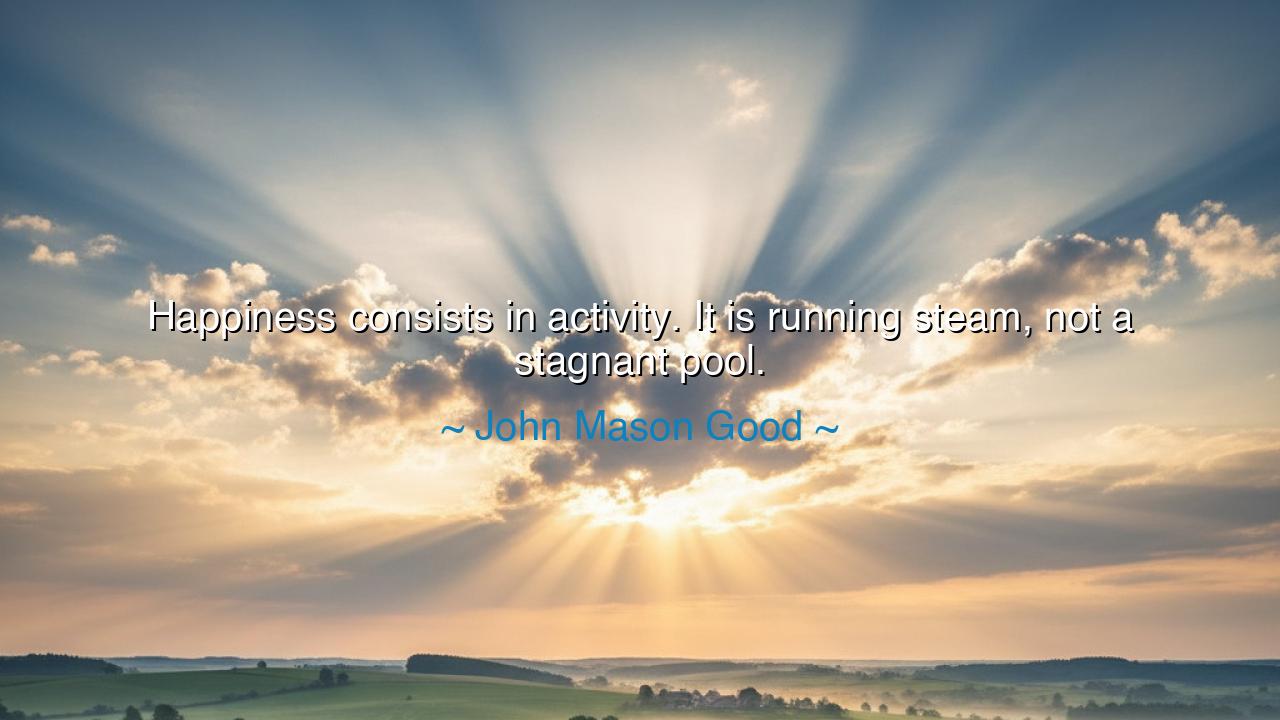
Happiness consists in activity. It is running steam, not a






“Happiness consists in activity. It is running steam, not a stagnant pool.” Thus wrote John Mason Good, the physician, poet, and philosopher whose life was devoted to both healing and reflection. In this radiant truth he captures the very rhythm of existence: that happiness is not a gift bestowed upon the idle, but the living flame born of movement, purpose, and effort. The spirit of man, like a stream, grows pure and bright only when it flows; when it ceases to move, it clouds, it spoils, it dies. So too does the heart, when deprived of activity, fall into the decay of despair.
The meaning of these words cuts to the core of the human condition. True happiness is not found in rest or comfort, but in the continual engagement of the soul. To live well is to be in motion — to strive, to build, to learn, to give. The running steam, as Good describes it, is not frantic or reckless energy, but the steady current of a life with direction and purpose. A man at work in his craft, an artist painting in devotion, a mother caring for her child, a thinker seeking wisdom — all are streams in motion, alive with meaning. The stagnant pool, by contrast, is the soul that withdraws from effort, that dreams of joy while refusing to labor for it. It becomes heavy and dull, for joy and vitality are born of participation in life’s great unfolding.
The origin of this insight comes from a man who knew deeply the harmony between mind, body, and spirit. John Mason Good, living in the early nineteenth century, was both a scholar and a physician — one who saw firsthand the connection between physical vitality and the vigor of purpose. In his time, he observed many who sought leisure as the path to contentment, only to find that idleness bred sorrow. As a doctor, he knew the body decays when it ceases to move; as a philosopher, he saw the same truth in the human soul. His metaphor of “running steam” arose from the new age of industry and invention, when power itself was born from motion. And so he taught that life, too, must flow to generate joy — that happiness is the energy of the soul in motion toward good.
History gives us luminous examples of this truth. Consider Leonardo da Vinci, who found his joy not in wealth or ease, but in the constant activity of his mind and hands. He painted, invented, observed, and dreamed — not to gain rest, but to live fully. His life was a ceaseless stream of creation, and from that movement flowed his happiness. Or reflect on Helen Keller, who, though born into silence and darkness, discovered her light through tireless effort. She once wrote, “Life is either a daring adventure or nothing at all.” Her activity, both physical and spiritual, was her liberation; her happiness was not the absence of hardship, but the triumph of motion over despair.
To the ancients, this teaching would have been familiar. The Stoics said that joy comes not from fortune but from virtue in action — from living in accordance with one’s nature and purpose. Aristotle, too, taught that happiness (eudaimonia) is the activity of the soul in harmony with excellence. The wise of every age knew that to be alive is to move, and to move is to grow. Stillness, when it becomes complacency, breeds death of the spirit. The one who strives — who shapes, creates, serves — feels the divine spark within, while the one who merely drifts is consumed by emptiness.
To live by this wisdom is to embrace motion as sacred. Rise each day with intention. Engage your hands, your heart, and your mind in acts that matter — however small. Seek purpose rather than comfort; let your work, your service, your curiosity be the steam that keeps your spirit alive. Even in rest, let your rest be purposeful — not a retreat from life, but a renewal for greater activity. Do not envy the idle, for though their bodies may be still, their souls are weary. The current of joy flows only for those who dare to move with it.
The lesson, then, is clear and eternal: to find happiness, do not wait for life to give, but give yourself to life. Be as running steam, ever in motion, ever giving energy to what is good and true. Work with your hands. Dream with your mind. Love with your heart. For the stagnant pool breeds decay, but the flowing stream sings as it travels toward the sea. Let your days be filled with activity — not noise or haste, but the living rhythm of purpose. In that motion, you will find not exhaustion, but renewal; not burden, but blessing. And when your life’s stream at last reaches the ocean, it will do so shining, alive to the very end.






AAdministratorAdministrator
Welcome, honored guests. Please leave a comment, we will respond soon